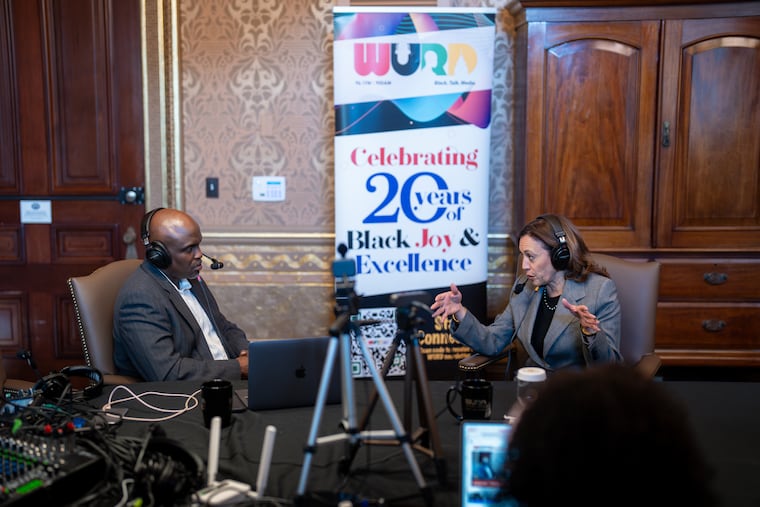A conversation with Kamala Harris on fixing racial disparities through the power of the Black vote
Much of the focus of this year's election rests on the role Black voters will play in the race for the White House. But, as the vice president noted, other contests are vital to our community, too.

WASHINGTON — On Monday morning, as sunrise spread over the White House complex, I and my WURD Radio colleagues prepared for a daylong broadcast featuring cabinet-level members of the Biden administration, including Vice President Kamala Harris.
As I walked through the complex, I did so knowing that Black Philadelphians will play a key role in determining which candidate claims Pennsylvania’s electoral votes in November. I believe the Biden administration knows it, too, as evidenced by its decision to invite the state’s only Black talk radio station to broadcast live from the nation’s capital.
We set up in the Eisenhower Executive Office Building, in a room once occupied by the secretary of war, and I asked White House press secretary Karine Jean-Pierre about America’s role in the Israel-Hamas war. She largely blamed Hamas for over 29,000 Palestinian civilian deaths while citing the Oct. 7 attack that killed 1,200 Israelis. She also spoke of the Biden administration’s efforts to stop the bloodshed, and just hours after our interview, the president announced that a cease-fire could be in place as soon as Monday.
But the concerns of the Black community go well beyond overseas conflicts.
I reminded Harris of that when we spoke, because the first time I saw her in 2020, at a campaign stop in Northwest Philadelphia, she was confronted by a Black man who told her that nothing would change for Black Americans in criminal justice if she and Joe Biden were elected. I asked her if the man was right.
“I remember that day very well,” she told me. Then she ran through a list of changes the Biden administration has made to address federal policing.
They include banning choke holds, restricting no-knock warrants, and requiring a federal database for police misconduct. She cited an increase in the U.S. Justice Department’s investigations of police departments that engage in racially biased policing and tens of thousands of pardons for marijuana possession.
However, federal law enforcement did not kill George Floyd, Eric Garner, Atatiana Jefferson, or any of the many Black people who’ve died at the hands of police in recent years. I asked the vice president what could be done to make change at the state and federal levels.
She said that as a senator, she was one of the authors of the George Floyd Justice in Policing Act, a comprehensive police reform bill that would impact law enforcement at all levels. The legislation is currently stuck in Congress, but she said there are other tools to change the racial disparities in criminal justice.
“This is why elections matter,” she said. “Not only in terms of who is in the White House. Not only in terms of who is in the United States Congress but statewide offices, local offices. It matters who your [district attorney] is. It matters who your attorney general is … It is in the best interest of everyone that the community can trust law enforcement. It is in the best interest of everyone that we recognize the disparities and then work to fix them. And a lot of the work can come, not only from the advocacy on the outside but who will be on the inside with the power to implement [change] from that position.”
“This is why elections matter.”
Of course, there are those trying to make change in other areas, including education. While the Biden administration has forgiven over $138 billion in federal loans, a policy that largely affects Black people (who owe more on average than white loan-holders), efforts to educate African Americans are being targeted by conservatives.
“We have to be clear-eyed and awake in terms of what is happening,” Harris told me. “When you’ve got so-called elected leaders who are passing laws to erase our history, to suggest that enslaved people benefited from slavery, to ban books in this year of our Lord 2024. When you’ve got so-called leaders who would erase or overlook the true and full history of America, including the fact that the Civil War was about slavery. When you look at what is happening that has been about deemphasizing — and in many ways an attempt to demote — Black history as America’s history, we have to see it for what it is and understand that in many ways there is an agenda that is afoot, and these are not isolated matters. And we have to take it seriously.”
There is much we have to take seriously, not the least of which is the power of our votes.